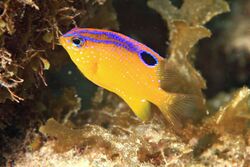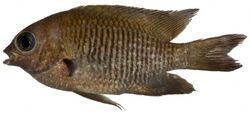Biology:Stegastes diencaeus
From HandWiki
Short description: Species of fish
| Stegastes diencaeus | |
|---|---|

| |
| juvenile | |

| |
| adult | |
| Scientific classification | |
| Domain: | Eukaryota |
| Kingdom: | Animalia |
| Phylum: | Chordata |
| Class: | Actinopterygii |
| Family: | Pomacentridae |
| Genus: | Stegastes |
| Species: | S. diencaeus
|
| Binomial name | |
| Stegastes diencaeus (D.S. Jordan & Rutter, 1897)
| |
| Synonyms | |
| |
Stegastes diencaeus, the longfin damselfish, is a damselfish in the family Pomacentridae from the Western Atlantic. It occasionally makes its way into the aquarium trade. It grows to a size of 12.5 cm in length.[2] Longfin damselfish have been reported to have a mutualistic relationship with mysid shrimp of the species Mysidium integrum. The interaction is described as a form of domestication with the shrimp providing nutrients for the algae farms the fish feed on and the fish providing protection from predators.[3][4]
References
- ↑ Rocha, L.A.; Myers, R. (2015). "Stegastes diencaeus". The IUCN Red List of Threatened Species 2015: e.T188592A1898995. doi:10.2305/IUCN.UK.2015-4.RLTS.T188592A1898995.en.
- ↑ Froese, Rainer and Pauly, Daniel, eds. (2008). "Stegastes diencaeus" in FishBase. December 2008 version.
- ↑ "We found algae-farming fish that domesticate tiny shrimp to help run their farms". 2020-12-08. https://theconversation.com/we-found-algae-farming-fish-that-domesticate-tiny-shrimp-to-help-run-their-farms-151615.
- ↑ Brooker, Rohan M.; Casey, Jordan M.; Cowan, Zara-Louise; Sih, Tiffany L.; Dixson, Danielle L.; Manica, Andrea; Feeney, William E. (2020). "Domestication via the commensal pathway in a fish-invertebrate mutualism". Nature Communications 11 (1): 6253. doi:10.1038/s41467-020-19958-5. PMID 33288750.
External links
- Photos of Stegastes diencaeus on Sealife Collection
Wikidata ☰ Q2209857 entry
 |


